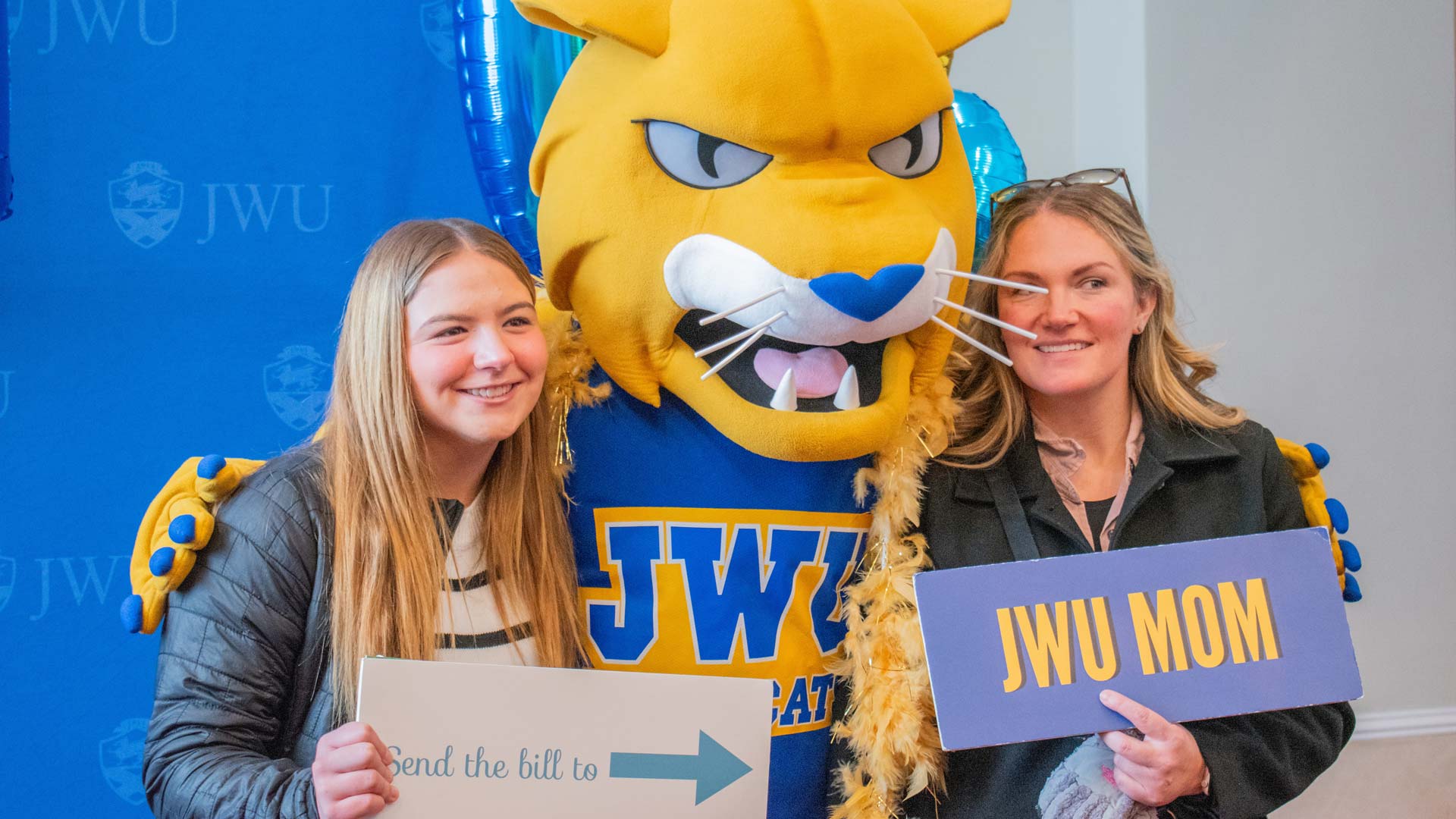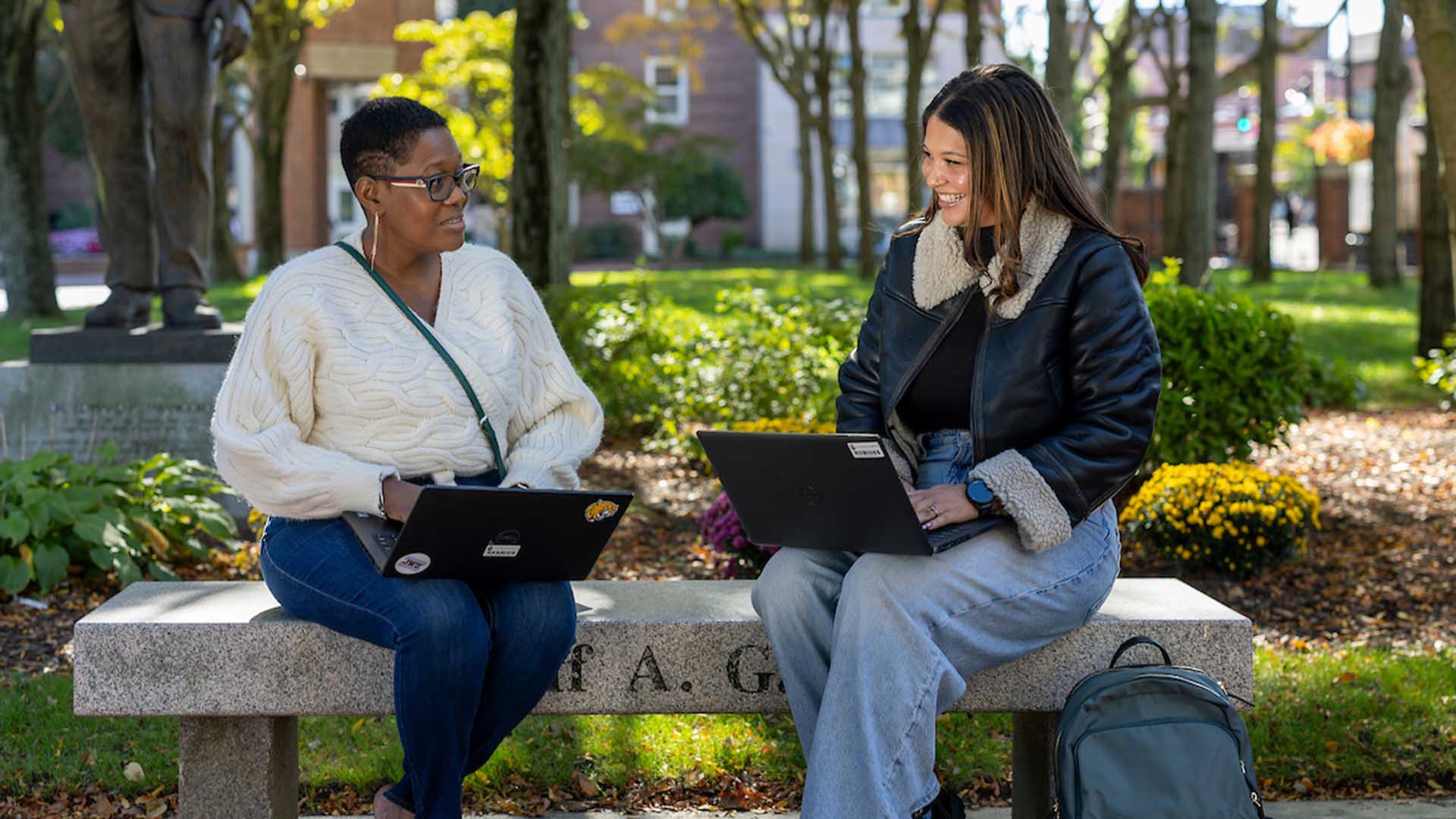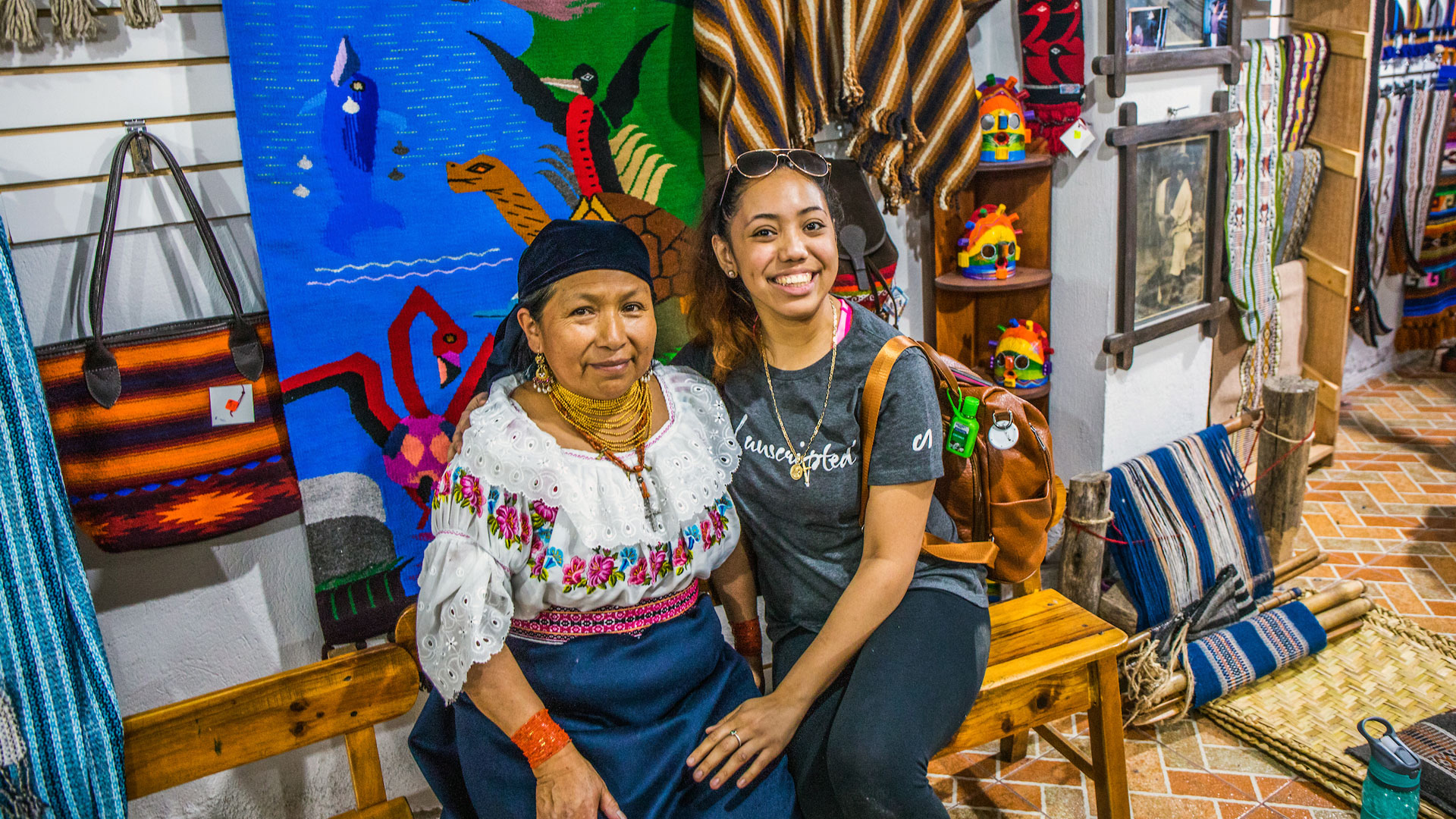JWU Alumni Share Insight on DEI and Belonging
Benefits of diversity, equity and inclusion initiatives have been scientifically documented — but what do they look like in action?
Marquis Cooper ’14, manager of global internal audit at Boston Scientific; Pauline Saintil ’18, assistant vice president of investment management at State Street Global Advisors, and Aaron Tien ’17, product manager at Warner Music Group, answered that question on February 28, 2024. The three Johnson & Wales University alumni were panelists in “Fostering Diversity, Equity, Inclusion and Belonging (DEIB) in the Workplace," sharing with the JWU community how they are making meaningful change in their work.
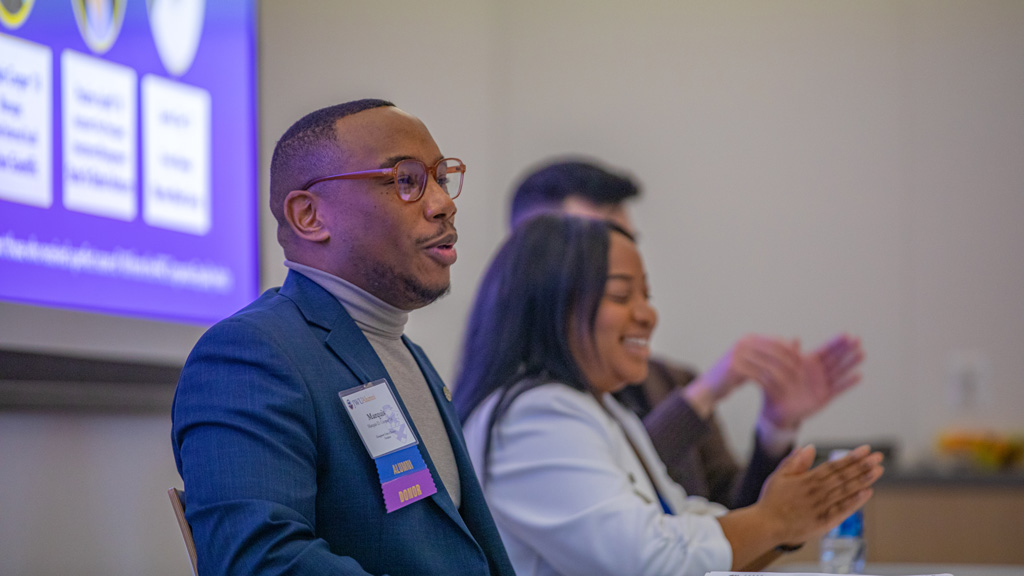
Cooper, Saintil and Tien all work at socially responsible companies who received a perfect 100 score on the Human Rights Campaign Corporate Equality Index, a national benchmark tool measuring inclusive corporate policies, practices and benefits for LGBTQ+ employees. Their work also aligns with the Civil Rights Amendment of 1964, and Remington noted that the panel was purposefully scheduled during Black History Month.
Read on for a recap of the DEIB panel, including questions from the audience and advice and tips from our alumni.
How Wildcats Can Seek Diversity, Equity and Inclusion (DEI)
Senior Director of Experiential Education & Career Services (EE&CS) Donna Remington urged students to research to ensure that companies align with their values, seeking details on employers’ DEI practices. "Ask yourselves: Are they transparent? Do they share the work still needed?," she suggested. "Do their job descriptions go beyond the required EEO statement and show a commitment to diversity? Do they have a diversity council or employee resource groups and break down to options for various populations?"
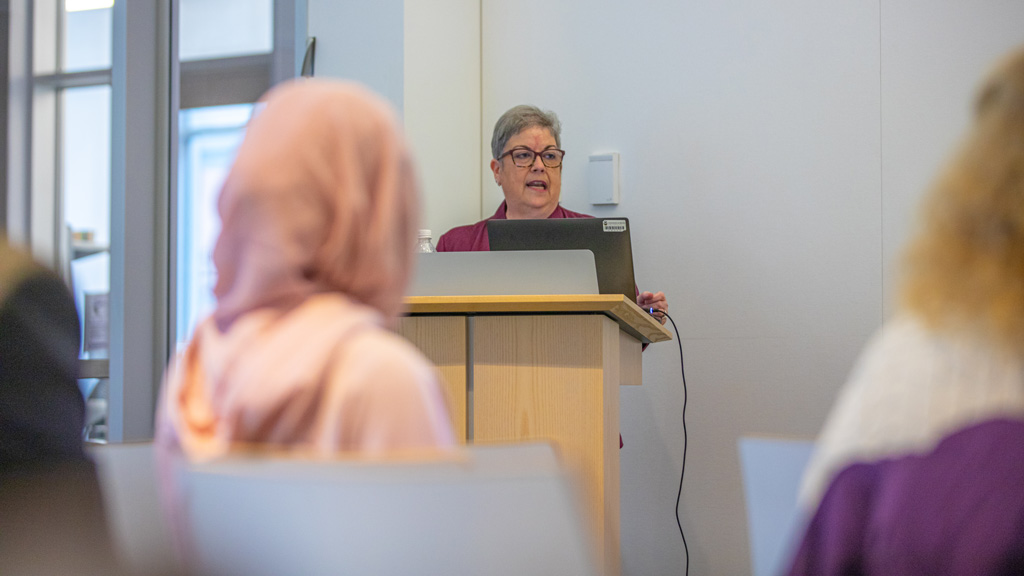
Remington thanked JWU Bridge for Diversity, Equity & Social Justice and JWU Alumni Relations for collaborating with EE&CS on this important panel and thanked Professor Christopher Westgate, whose classes and research address racial, ethnic, gender and sexual identities, for moderating.
DEIB Panel Discussion Highlights
On how DEI impacts each alum personally, and how they help make the companies they work for more inclusive
Tien, of Warner Music Group, spoke of how music is so diverse with so many cultures and aspects of the world that he can connect with fans and artists of all races and backgrounds through bringing passion and love to products. "Anyone can put a photo on a t-shirt and sell it, but you won’t understand my background or full upbringing," he stated. "People of color bring more perspective and a broader view to the table.”
Saintil, of State Street Global Advisors, expressed her responsibility as a woman and a person of color to be visible and show her face. "I try to make sure that my face is out there as much as possible so women coming into the workforce at a young age can see me and think, ‘I can do this too,’" Saintil said. She particularly loves being visible to young Black women to help put their dreams in perspective.
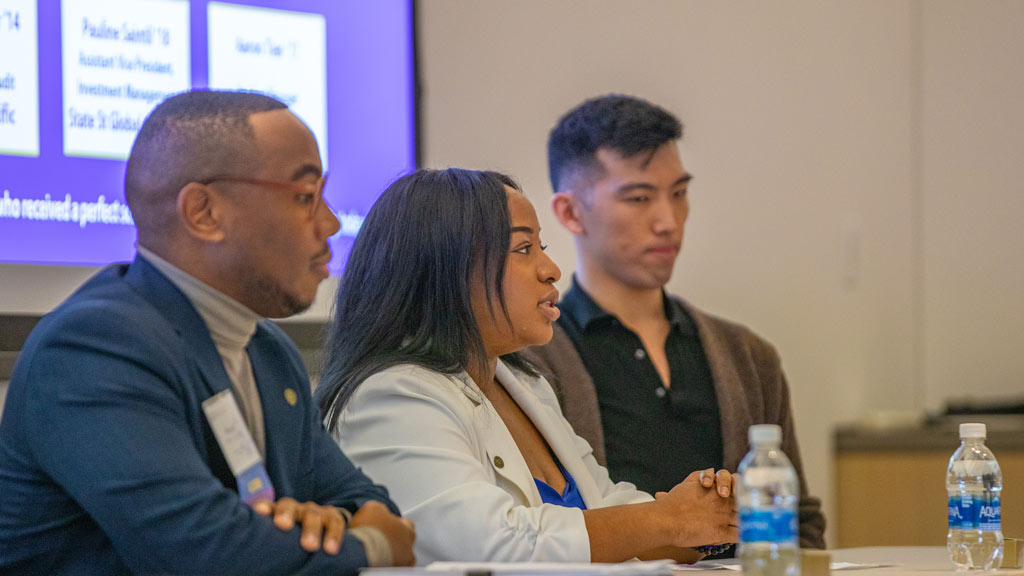
As a manager, Cooper feels that representation is one of the biggest elements of encouraging and reinforcing DEI. "Boston Scientific ensures that people of different backgrounds are represented in leadership because they execute that day-to-day," he stated. "It’s not just background and heritage but diversity of thought, diversity of work mode and ensuring that diversity is at the forefront and constantly encouraged.”
What to say to people who argue that "DEIB" has reached its expiration, or that it doesn’t communicate the same thing to everyone, given the political divides in our country right now
Cooper noted that someone will always be upset about an acronym. “When I hear ‘Has it reached expiration,’ I counter that with, ‘It has reached a new level of exploration,’" he countered before noting that equity was only recently added to D&I and we're still discovering how to encourage equitable opportunities. "Instead of reacting to terminology, people should focus on what DEIB actually means," he added. "It’s about creating opportunities and representation, not taking away from others."
Saintil agreed. “There’s so much work to be done, so much more to explore. It’s not enough to have in place; it has to become the norm, become what’s expected without being a requirement or to meet a quota. Once we reach that level, the term can expire.”
“This panel shows that we’re not near expiring; we’re at the cusp,” Tien observed. “It’s rewarding to see, but is it enough? We do look at race a lot, but we can take it one step further and look at people with disabilities, examine accessibility issues and consider the term broader than race and what we look like on the outside.”
Favorite ways to support the inclusion of individuals from underrepresented or marginalized communities
“Anytime we get a chance to see crossovers and collaborations between our employee resource groups is great," Cooper said. “Explorations of intersections between the groups they represent is important.”
Saintil shared her experience working with a Black female mentor who’d been with State Street for 30 years, and how that relationship encouraged her to be a mentor to others, bouncing off ideas and sharing opportunities.
Tien loved creating a Pride t-shirt for “Moulin Rouge,” with profits going to the Marsha P. Johnson Foundation to help give rights to trans folks: “It was really special to start that idea and create a full product that did good."
How to address intersectionality in DEI efforts to ensure that individuals with multiple marginalized identities are supported
"Be intentional," advised Cooper. "Think about the outcome, who it will touch/inspire/advocate for/provide resources for; don’t just do it to do it.” He implored individuals and organizations to make sure they're educated and exploring intersections. "If you’re targeting Black employees, are there also opportunities for indigenous/Native American heritage to be celebrated?”
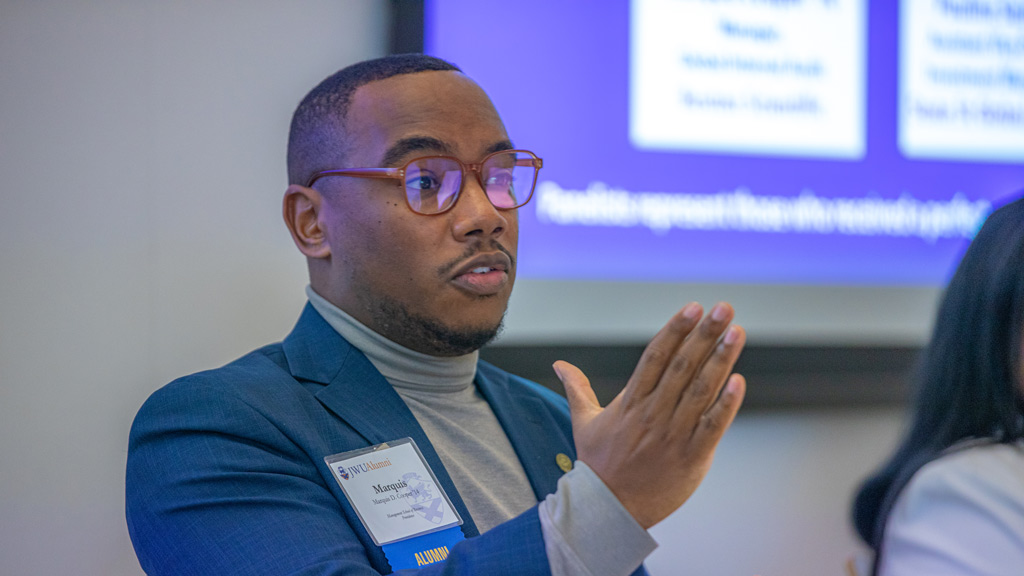
Saintil noted how her multinational team led to learning about different holidays and perspectives, which helped everyone become more culturally sensitive. “Be curious, get to know about other cultures,” she advised. “Always ask questions. People want to share!”
Tien agreed; he is the only Asian and queer person on his team and appreciates that colleagues aren’t afraid to ask questions. “I feel like I bring a different perspective and shine a new light they’re not familiar with,” he explained. “You want to feel welcoming to each other; it should be an open space.”
How to balance what you do intentionally with research brought to each group
“Engage with allies,” advised Cooper, explaining that diversity isn’t just about race but encompasses gender, sexual orientation and more. "Educate yourself to be curious."
“If you’re curious what others go through, come to group events,” Saintil suggested. For example, she had introduced some colleagues to a Haitian food truck after one of them remarked that the food smelled good.
“If you’re Googling, you won’t get emotion or passion,” said Tien. “Both are important. I can read, but when you explain something the importance shows. Ask what something means to you, and don’t be afraid to ask questions."
How companies can foster a culture of belonging and safety for employees of all backgrounds, ensuring that they feel valued and heard
Saintil’s company has a “speak up” helpline where employees can anonymously report a situation in which they feel uncomfortable, as well as employee resource groups that serve as a way to help make change in the workplace. She also makes her team comment on posts and TED Talks on the company's Yammer board. “It helps engage people and encourages them to speak up,” she noted.
Cooper’s company launched a global strategy with people dedicated to employee well-being and wellness. “DEI councils are a good default,” he said, “But the bigger thing is to make sure while employees are taking care of patients, someone is also taking care of employees.” He stressed the importance of educating people on added benefits and available resources. “Make sure people are aware,” Cooper advised.
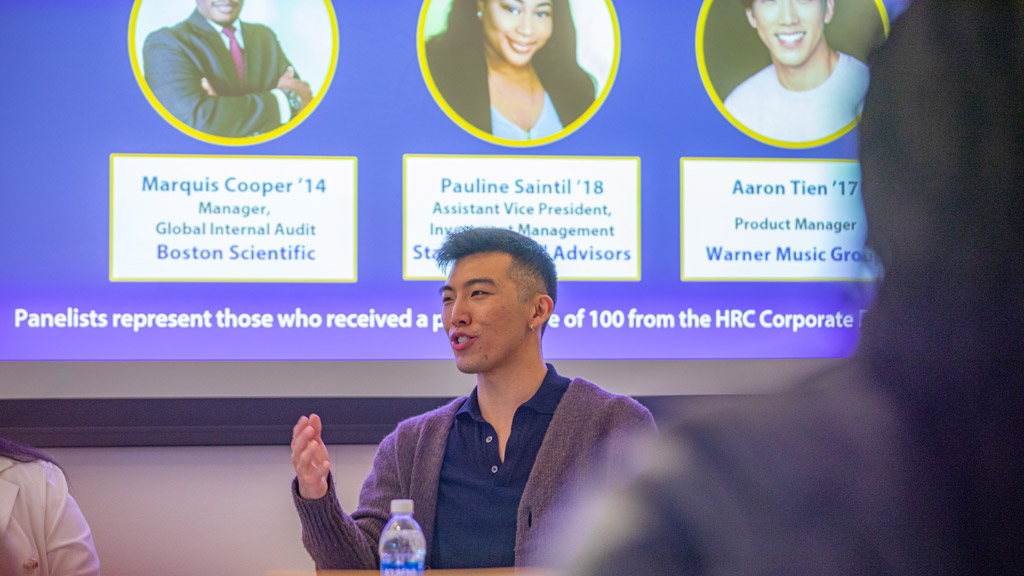
Tien spoke of creating safety through camaraderie and community. At the beginning of COVID, he'd been the only front-of-house Asian person and felt alone and unsafe as the only person who might potentially get targeted. Now, he feels safe at his current workplace with a diverse team. “Maybe if I had more people like me we could have tag-teamed,” he said. “In my current position, I really lean on my co-workers.”
Audience Questions for the Panel
As alums, thinking back to your JWU student experience, what was DEIB like then, and what helped prepare you for your current roles?
“Back then it was evolving,” Cooper responded, “And to see now 10 years later what it’s blossomed into is refreshing. It’s not just diversity of skin tone or background but diversity of thought, work mode, accessibility and more that makes education more accessible. It’s nice to be able to see evolution in it and to think that we were part of that.”
“In the Finance program, the WIV (Wildcat Investment Fund) was notorious for being mainly hockey team boys, but JWU has come a long way since then,” shared Saintil. “I’ve kept up with the page and have been seeing a lot of diverse students on the WIV. In my major that may not have been the norm at the time, but I never felt at JWU that I wasn’t included. I always felt belonging here, so I was glad to come back.”
“Our inaugural Media & Communications class was very diverse, very women-heavy, with many people of color among us really driving that class,” Tien remarked. “I was also a part of the Ataxia dance team focusing on hip hop, multicultural, Black-influenced music which we performed down all these streets. Now the dance team is all women; we’re moving in a great direction.”
When you were graduating and leaving JWU, did you honestly think you’d be in this position in 2024? Is this final or, if not, where do you see yourself going?
Tien didn’t expect to land in merchandise at all when he first entered the working world. “I got a gig of touring/managing merch on the road, now it’s been a 7-year career managing merch,” he shared. “I wanted to be a TV personality (now we have TikTok!), so I interned at WPRI but found it wasn't the environment for me. Yes, I see myself continuing; I’ve found new love in the numbers of it all. I love the creativity but want to tap into analytical and statistics.”
(“We’re a good influence,” quipped Cooper to Saintil.)
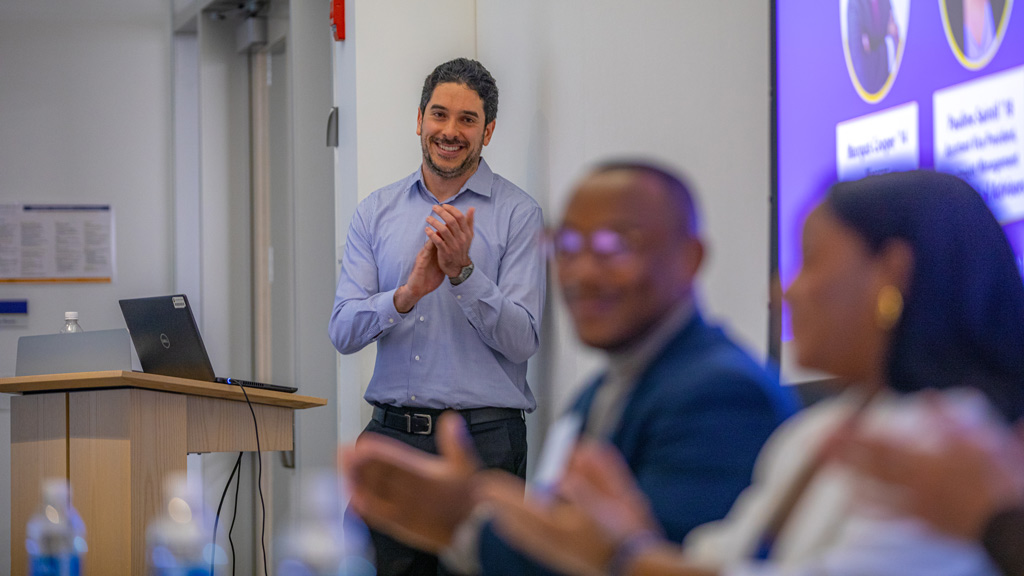
Saintil shared that she had been a “master manifester” while at JWU. “I had internships based on what I wanted to pursue, worked at the Grad Center, served as the director of finance for my sorority, had a job offer six months before graduation and worked full time while finishing classes,” she said, stating that she had always followed a five-year plan. “I stuck to what I wanted to do, really did persevere and I’m so glad I’m where I am. I hope to keep on this upward trajectory in my career.”
Cooper had a similar roadmap while a Wildcat. “I had an idea of where I would be and what I’d be doing,” he said. “I'm a child of the Career Services team; I got to meet the employers firsthand, did an internship, got my résumé and went through many layers. I was fortunate to have the first job lined up right after school, which is something we want for all students. I like to think I was equally fortunate and prepared, and I expect that track to continue upward from here. I’ve gotten comfortable with saying I don’t know what's next, but I know it’s something I’ll be good at, ready for and excited about.”
How would you encourage peers or seek out other people who would be interested in increasing DEIB?
Cooper referred to Saintil's earlier mention of self-advocating. “It takes a lot to be able to articulate intentions," he said. "What does that mean, and who do I need to tap to start actualizing that? It comes with time as you move through the ranks; you hit a sweet spot of comfortable with talking to managers, direct reports and even VPs. Part of that is finding people with similar interests. It’s hard to say no to a group of people as opposed to just one person. It involves more introspection than most people realize. Get definition around it, and the execution should be easy.”
“Be the change you wish to see in the world,” Saintil advised. “I get lots of emails from people on LinkedIn from JWU and BU who ask me to push their résumés forward. I do what I can when I see kids who remind me of myself and how hard it was to network and get into these spaces. I try to provide mentorship, and I’ll usually schedule a call to get to know them a bit in order to be able to help them.”
“Networking is important,” stated Tien. “Doing your best and making an impression helps a lot. I get messages all the time from interns, and I let them visit. I give them the rundown on my side of the business, help them out, introduce them to people and pay it forward.”
Ultimate Takeaways
All four alumni agreed on one short but important piece of advice: “Show your face.” Students should have questions to ask and should have an elevator pitch.
“Be bold, ask deeper questions, and be that person to make that change happen,” commented Director of Alumni Relations Marie-Ines Valdepeñas after thanking the panelists for their insight and transparency.
“As JWU alumni, we bring our community together and celebrate us all,” Valdepeñas concluded.
About the Panelists
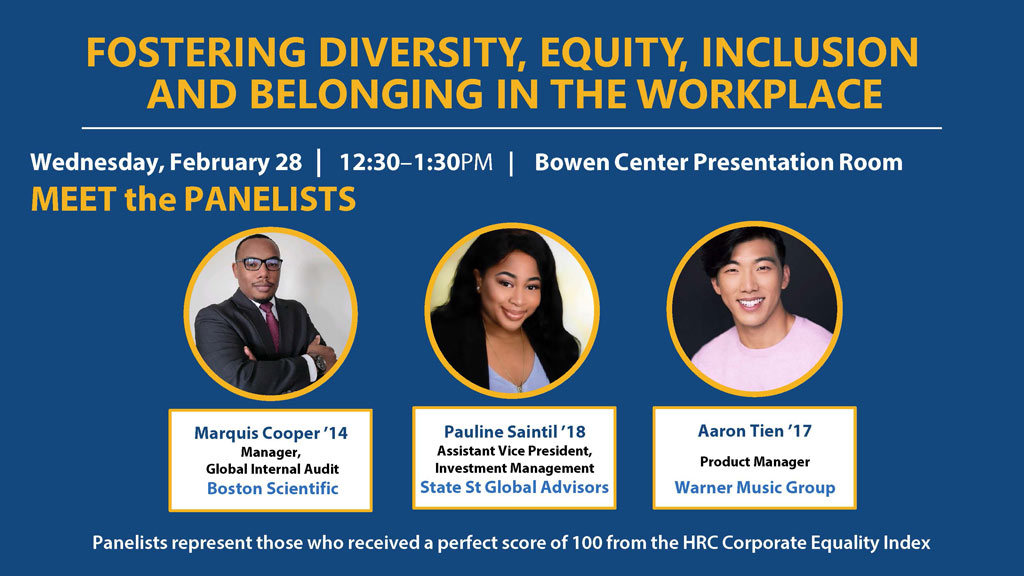
Marquis Cooper '14, who majored in Accounting and concentrated in Finance at JWU, is currently pursuing his Master’s in Finance at Bentley University. He serves on the boards of directors for the Massachusetts Society of CPAs (MassCPAs) and the MassCPAs Educational Foundation. As manager of global internal audit at Boston Scientific, Cooper oversees a team of three analysts and completes planning and execution of various audit and advisory projects for the company’s divisions, sales offices and finance organization. He also serves on the Finance DEI Council and as the leader for BRIDGE, an employee resource group dedicated to enhancing the experience for black employees and employees of color.
A seasoned finance professional with a track record of identifying gaps, automating reporting and delivering results on behalf of her team and clients, Pauline Saintil '18 is an assistant vice president at State Street Global Advisors, supporting investment management. Prior to SSGA, she was an analyst at Fresenius Medical Care, a healthcare company focused on providing the highest quality care to people with chronic conditions. She has also worked in FP&A at UNFI, a food and beverage distribution company focused on delivering high-quality organic and natural foods, merchandising assistance and category management to UNFI’s customers.
After earning his B.S. in Media & Communication Studies from JWU, Aaron Tien '17 worked as a merchandising manager with Playbill Pyt & The Araca Group. Tien’s years of experience in the merchandising world include merchandising/product manager in the live theatre as well as merchandising through touring and the music industry. Today, Tien applies his strong communication and people skills as product manager at Warner Music Group.
